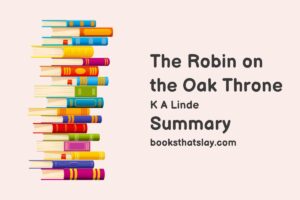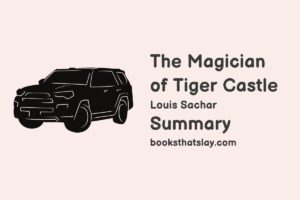Keeper of the Lost Cities Summary, Characters and Themes
Keeper of the Lost Cities is a fantasy book for young readers.
It follows Sophie Foster, a telepathic girl who discovers she’s not human, but an elf from a hidden, magical world. Forced to leave her family, she enters the Lost Cities, with its strange customs and beautiful inhabitants. Sophie goes to a special academy for young elves, unearths secrets about her past, makes friends, and faces dangerous, powerful enemies.
Summary
Sophie Foster, a twelve-year-old telepath, has always felt different.
During a school field trip, she’s confronted by the mysterious Fitz, an elf who claims she’s one of them.
Sophie’s world is completely overturned as she’s whisked away to the Lost Cities, a dazzling realm of ancient civilizations. Humans are seen as lesser beings, relics of a past conflict. Yet, Sophie is not simply an elf – she’s something more, something shrouded in secrets from her very existence.
She’s introduced to the elf Council, where her immense potential and hidden past stir distrust and skepticism, particularly from Councillor Bronte. Despite these doubts, she’s admitted to Foxfire Academy, a prestigious school for young elves. Her human family’s memories are wiped clean, leaving Sophie to forge a new life in this alien world.
Adjusting to elven customs and fitting in proves challenging.
Sophie meets new friends like the kind Dex and the mischievous Keefe, and develops a tentative bond with Fitz’s family. Each day brings struggles with newfound powers and classes – Sophie excels in some, but flounders in others like Alchemy. Amid these challenges, Sophie’s adoptive parents, Grady and Edaline, provide a loving home, although their past grief remains a sensitive wound.
As Sophie delves into her studies, she discovers hidden abilities and glimpses of forgotten memories.
Strange messages and cryptic gifts appear, alluding to a forgotten power that could be the key to stopping a rash of inexplicable fires plaguing both the human and elven worlds.
This sets her on a collision course with the Council who refuse to acknowledge the threat.
Meanwhile, she feels betrayed when she discovers Biana, Fitz’s sister, is only befriending her for ulterior motives. Feeling alone and misunderstood, Sophie seeks solace, making her vulnerable to a sinister group who kidnap both her and Dex.
Her captors, desperate to unlock the secrets buried within her mind, find their efforts thwarted by an unseen mental barrier. Sophie and Dex are rescued, but the incident leads to a daring light leap, a form of elven teleportation.
Without protective shielding, the dangerous journey nearly kills them, but Sophie’s desperate call for help brings Fitz and Keefe to their rescue.
Weeks of recovery follow, along with a Council hearing to determine Sophie’s punishment for repeatedly flouting elven law. They deem her actions, though dangerous, to be counterbalanced by mistakes on the Council’s part and the suffering she’s already endured.
It’s a bittersweet victory, as while Sophie technically passes her courses at Foxfire, she still faces failure in Alchemy.
However, her burgeoning ability to inflict pain with her mind earns her a unique opportunity – training under the notoriously strict Councillor Bronte in a newly manifested ability.
It’s a chance to prove herself and silence her doubters, though acceptance comes with a price.
The Council demands Sophie choose between the two families vying for her adoption.
Ultimately, Sophie chooses Grady and Edaline, recognizing within their shared grief a chance for mutual healing. With Alden’s blessing and the unwavering support of her friends, Sophie finally begins to feel at home amidst this strange and wonderful new world, ready to unravel the mysteries that entwines her fate with that of the Lost Cities.

Characters
Sophie Foster
Sophie is a courageous and adaptable protagonist, thrust into an unfamiliar world and forced to navigate its challenges.
Her telepathic abilities make her a natural outsider, but she doesn’t succumb to self-pity. Sophie possesses a strong moral compass, even if it means occasionally disregarding the rigid rules imposed by the elf Council.
Her willingness to question authority, combined with a fierce loyalty to her friends, makes her a relatable and inspiring character. At the heart of her journey lies a struggle for self-acceptance, balancing her human roots with her burgeoning elven powers.
Fitz Vacker
As the epitome of the “golden boy” archetype in elven society, Fitz embodies the allure and pressures of the privileged class.
Initially, he seems almost too perfect, a reflection of the rigid expectations and social hierarchies of the Lost Cities. However, as the story progresses, Fitz reveals a deeper vulnerability and a genuine desire to carve his own path, separate from his family’s legacy.
His developing bond with Sophie challenges his preconceived notions, allowing the reader to glimpse the potential for a gentler and more understanding leader.
Dex Dizznee
Dex is a brilliant outcast, his intelligence and skill as a Technopath constantly undermined by his family’s low social standing within elven society.
This fuels his resentment of the elite and makes him an incredibly loyal friend to Sophie.
He sees Sophie for who she is, not as a potential threat or a status symbol. His practicality and quick thinking make him a vital asset to Sophie as she encounters various trials.
Dex personifies the idea that talent and potential aren’t determined by family background or social acceptance.
Councillor Bronte
Bronte represents the old guard of elven society, clinging to tradition and deeply suspicious of outsiders.
His powerful position as an Inflictor, coupled with his distrust of Sophie, make him a formidable antagonist. While his motivations often stem from a misguided sense of protectiveness toward the Lost Cities, Bronte demonstrates a willingness to abuse power in the name of maintaining control.
His character highlights the dangers of blind adherence to tradition and the importance of challenging entrenched systems of power.
Themes
Identity and Belonging
Sophie Foster’s journey is fundamentally one of finding her place in the world. Having grown up as a human, believing she was one of them, her discovery that she’s an elf shatters everything she knew.
The Lost Cities offer beauty and wonder, yet she is also an outsider. Sophie grapples with internal conflict, struggling to reconcile her human upbringing with her elven heritage.
The Elf Council’s distrust because of her unusual circumstances further emphasizes this sense of never fully belonging. Her struggle is a powerful reminder that where we come from is only one piece of who we are; true belonging lies in finding a community that accepts us as we grow and discover ourselves.
The Importance of Found Family
Blood ties do not automatically equal family, and Keeper of the Lost Cities emphasizes this beautifully. Sophie’s human parents loved her, but her elven identity always separated them.
Conversely, Grady and Edaline, despite not being biologically related, provide unconditional love and a safe haven for Sophie as she navigates her new world.
Their shared pain over losing a daughter strengthens their bond; they become a family not because of DNA, but because of their enduring love and support.
Furthermore, Sophie forges powerful friendships with Dex, Keefe, and others. These friends understand her more than anyone back on Earth, becoming a chosen family that celebrates her differences and offers the acceptance she desperately needs.
The Power of Choice in the Face of Prejudices
The elven world is built on strict social hierarchies and an ingrained distrust of humans.
Many elves, like Councillor Bronte, view Sophie with contempt because of her mixed heritage and unusual powers. However, individuals like Alden, Dex, and her close friends defy these prejudices, judging Sophie based on her character rather than her background.
Sophie, too, has opportunities to make her own choices, particularly when faced with information about the mysterious fires. Instead of blindly obeying the Council’s inaction, she follows her instincts and conscience, even if doing so breaks rules.
The book highlights that even in rigid societies, individuals always have the power to challenge injustice and choose a path based on their own moral compass.


